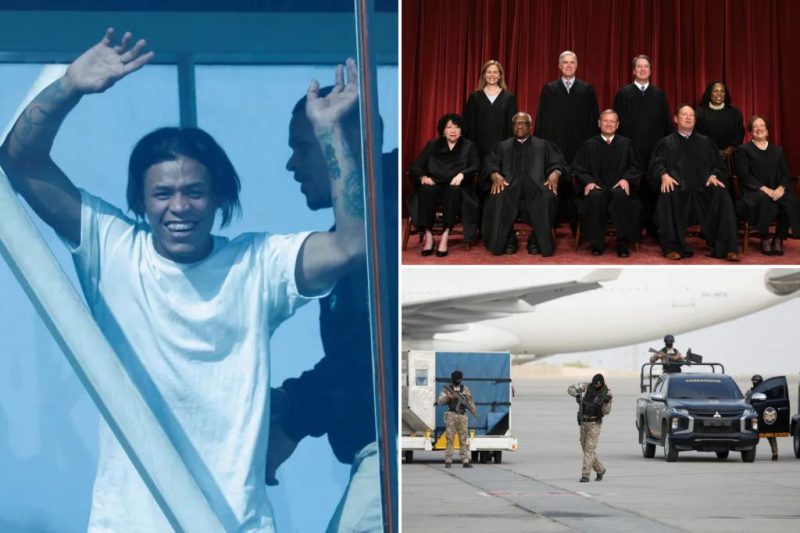
The US Supreme Court issued an emergency order on Saturday, temporarily halting the deportation of Venezuelans held in northern Texas. This dramatic intervention centers around the Alien Enemies Act of 1798, a wartime law dusted off by the Trump administration to justify the removals.
The American Civil Liberties Union (ACLU) swiftly appealed the deportations, arguing that the detainees were being removed without proper due process. The Supreme Court’s brief order instructed the administration to cease deportations from the Bluebonnet Detention Center ‘until further order of this court,’ a decision met with dissent from Justices Clarence Thomas and Samuel Alito.
This action follows an earlier April ruling by the Supreme Court stipulating that deportations could only proceed if individuals had a chance to present their case in court and were given sufficient time to contest their removal. However, the ACLU contended that immigration authorities were circumventing this ruling by initiating new deportation efforts under the Alien Enemies Act.
The ACLU’s emergency filing alleged that immigration authorities were labeling Venezuelan men at the Bluebonnet facility as members of the Tren de Aragua gang, triggering the application of the Act. This accusation, the ACLU argued, allowed for swift deportation regardless of immigration status. Affidavits from immigration lawyers supported this claim, detailing how their clients were pressured to sign deportation papers without proper legal counsel or understanding.
Adding to the complexity, two federal judges previously refused to intervene, citing jurisdictional limitations. One judge acknowledged the legitimacy of the concerns raised but lacked the authority to issue an order. Another judge, who had previously issued a temporary halt on deportations, found himself powerless in this instance, due to the Supreme Court’s ruling which limited such orders to the jurisdictions where detainees were held. Despite this, the same judge had recently found probable cause that the Trump administration was in criminal contempt for disobeying a prior deportation ban.
The Alien Enemies Act, rarely invoked, has only seen use three times in US history; most notably during World War II for the internment of Japanese-Americans. The Trump administration’s recent use of this law to target Venezuelan nationals has sparked widespread controversy and legal challenges.
The ACLU expressed relief at the Supreme Court’s temporary stay, emphasizing the risk of detainees facing indefinite imprisonment in El Salvador without due process. The legal battle continues, highlighting the ongoing tension between immigration enforcement and the preservation of individual rights in the face of an antiquated law. The coming weeks will reveal whether the Supreme Court’s intervention will lead to a broader reconsideration of the Trump administration’s deportation strategy and the application of the Alien Enemies Act in the 21st century.










